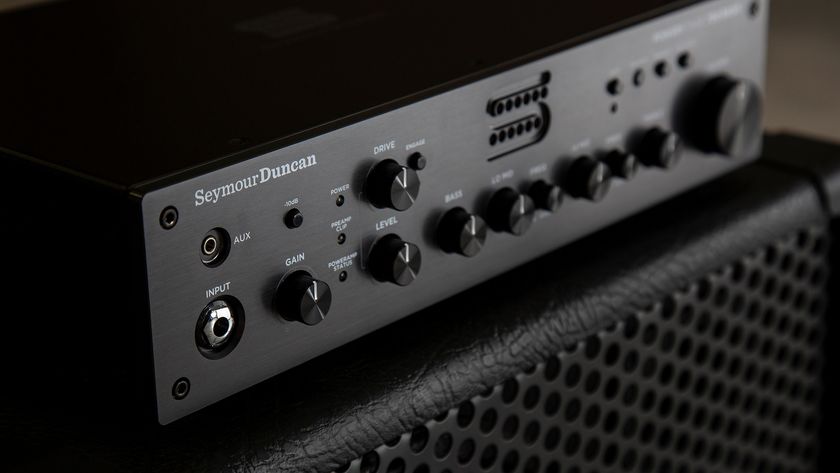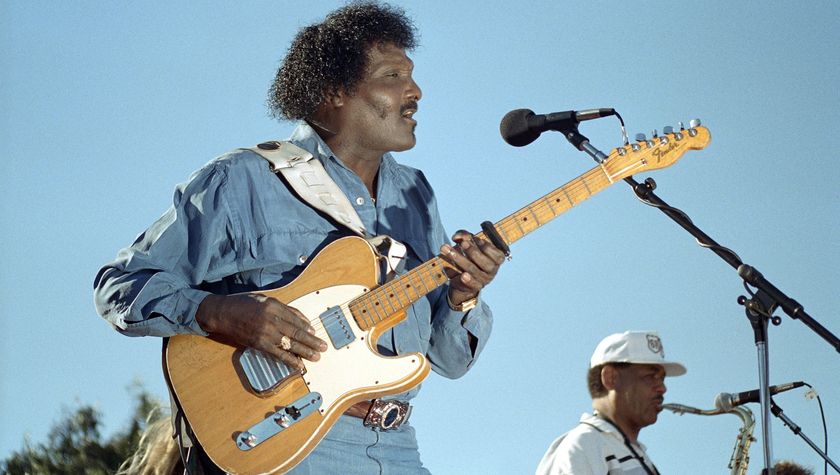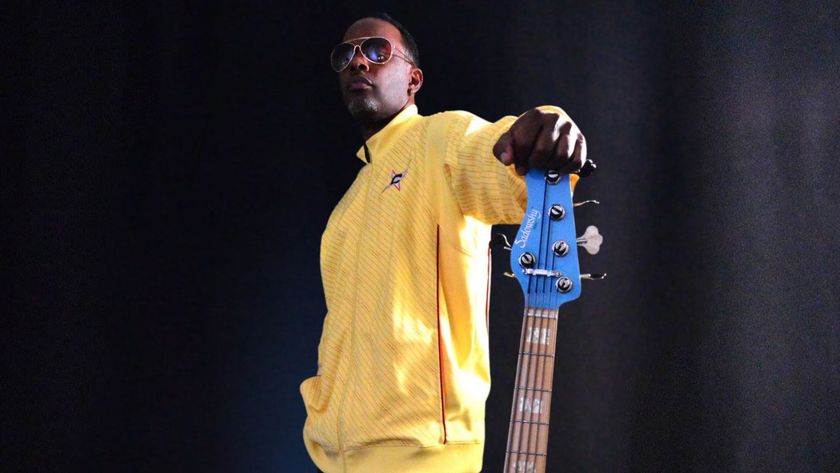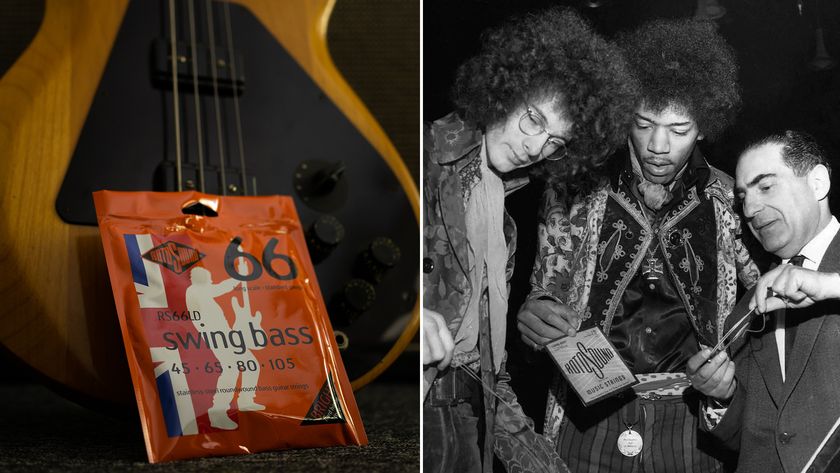Indie-rock trailblazers Martin Courtney and Francis Lung wax lyrical on the gear and songwriting behind their new albums
![[L-R] Martin Courtney and Francis Lung](https://cdn.mos.cms.futurecdn.net/YYL2BUmtHkr6b7ayq8dkWb-1200-80.jpg)
You can make surface-level comparisons between Francis Lung and Real Estate's Martin Courtney with ease: both guitarists are known for their similarly laid-back indie-rock songwriting styles, in which they regularly blend luscious selections of guitar tones with glorious melodies and silky arrangements.
But of course, no two musicians are ever the same. By way of upbringing – Lung hails from Manchester, England while Courtney was raised in Ridgewood, New Jersey – or past struggles – Lung tackles mental health, substance abuse and relationships on his latest album Miracle – the musical output of each artist is an amalgamation of their unique set of life experiences.
Here, the pair sit down for an in-depth conversation with one another for Guitar World, in which they talk Miracle, Real Estate's new EP Half a Human, and the gear and songwriting choices that fueled the creation of each.
Francis Lung: “Hey Martin, thanks so much for doing this. I love the new Real Estate EP and I’ve been really curious as to how you put it together. But before all that, how are you? What have you been up to?”
Martin Courtney: “I'm just finishing a solo record, so I'm kind of in a whole different headspace than when I recorded the EP. I play almost all the instruments on that and it just feels like more of a comparable situation to yours, although actually I have no idea how you made Miracle. What do you play on it? Everything?”
Lung: “Yeah, everything. Except on Bad Hair Day my good buddy Andrew Richardson plays drums because he's better at playing fast than me. But the rest is me.”
Courtney: “I'm impressed. First of all because I don't play drums on my record. I just don't have the confidence. You know, I'll play drums on like demos and stuff. But no, it's really good. Really, really impressive record, man.”
Get The Pick Newsletter
All the latest guitar news, interviews, lessons, reviews, deals and more, direct to your inbox!
Lung: “Thanks so much. It's crazy to hear that from you. You're a good drummer though, you drummed on Pretty (Ugly Before), your Elliott Smith cover for Everybody Cares (a Bandcamp compilation of Elliott Smith covers organized by Francis for LGBTQ+ charities).”
Courtney: “That I did. Thank you. It's just, you know, I feel like I want to have somebody on the record that I know is going to just nail it. And do like fills and stuff.”
Lung: “Do you record backing tracks live with Real Estate?”
Courtney: “So for the EP and at least the last like three records we've done bass, drums, usually like my guitar and maybe some like keys in the live take and then kind of build off of that.
“That's the other reason I like playing with somebody else because it gives you an opportunity to to add to the songs a little bit. You know, little pauses and ideas that might not come out of the initial writing process or something.
“There's a lot of that on your record, though, which is again why I'm very impressed by it. The songs feel very worked out and thought through and I don't know, I just am very impressed by it. And I feel like it sounds like you spent a long time working on it.”
Lung: “Thanks! I guess so. I did a whole version of the album on a Yamaha MT8X cassette eight-track recorder, which is really cool because you're working without a screen.
“Drafting it like that and doing a lot of listening you figure out stuff, like ‘I'm bored at this point. The rhythm needs to change here. There shouldn’t be a second verse’ etc. It helps the final arrangement sound more interesting.
I played bass in a bunch of bands in high school and college and I didn't really learn guitar until I was like 19 or 20
Martin Courtney
“It's necessary for me to edit a lot because as a guitarist writing a song I tend to just kind of play all the way through, I guess to outline the structure.”
Courtney: “Yeah, I think that's a good probably an explanation for it. Like for me, I'm writing rhythm guitar tracks and the tendency is to just strum all the way through. And, sometimes that's cool, but yeah it's good to break it up a little bit.”
Lung: “It's just like, as songwriter/guitarists it's not normally our role to do much more than lay the foundation for a song, then the other band members come in and add the stuff you wouldn't have thought of.
“But then if you're doing a solo record, you have to do the Elliott Smith thing. He said, ‘I have to put on all the different hats’ meaning you have to be all the band members at once – ‘What would the pianist play here? What would the organ do?’
“What about playing bass? What do you think about playing bass?”
Courtney: “I love it. My first instrument was bass. I played upright bass when I was a kid, all throughout Middle School and high school. And I think when I was like, 10, or something I was really into music and I wanted to play guitar, but I couldn't. It was just too, like, hard for me.
“And I think someone told me that, you know, an electric bass is the same thing as upright, just turned on its side! So I played bass in a bunch of bands in high school and college and I didn't really learn guitar until I was like 19 or 20.”
Lung: “Do you sometimes write basslines for Alex [Bleeker, bassist in Real Estate] and he'll go, ‘Can I change it?’ And you're like, ‘No.’ [laughs]
Courtney: “It used to be a lot more like that, especially our first couple of records, I really was more of a control freak. And I wrote most of the parts and a lot of them on the third one, too, you know, a lot of stuff that people give our ex-bandmate Matt [Mondanile] credit for writing, but that's neither here nor there.
“Growing up, Alex was always like the rhythm guitar player and I was always the bass player, but we switched kind of for Real Estate because I became the songwriter in that band and so he wasn't the most confident on the bass for the first couple years.
“Now he's like, a better bass player than I ever was, he has this touch you know, like, it just sounds better when he plays it. It's weird. And he's gotten really good at writing parts. He's pretty much taken over that job.
It is a band and everybody wants to feel like they made their mark on the song, rightfully so. You end up with more unexpected results that way
Martin Courtney
“And I also kind of relinquished a lot of control. These days I write a song structure and a chord progression but I try to only bring that to the table and not get too attached to anything else in terms of my vision for what I think the song should be because like that generally just ends in frustration for me.
“It is a band and everybody wants to feel like they made their mark on the song, rightfully so. You end up with more unexpected results that way.”
Lung: “Yeah. Do you think being a dad contributes a little bit to that as well? Because you're like, you know what, I don't really have time to make arrangements for these songs!”
Courtney: “I was gonna say that. We’d just had our second kid when Julian joined the band and I was just stretched so thin and I was just like, I think this will be okay if I just have faith in my bandmates that it's gonna work out.
“I'm actually really happy with that record [In Mind, 2017]. But yeah that's why making this new solo record has been really fun. Because it's like, ‘All right, I'm gonna get back into writing all the parts.’
“Honestly, listening back where I’m up to with this solo record I am having a bit of a crisis of confidence, like; ‘I am not putting enough thought into this album at all, I need to go back and write some string parts!’ [laughs]
“Did you arrange the strings for Miracle too? Did you write those parts?”
Lung: “Yeah. They were written, and then my friend, Robin Koob came in and she would play what was written and we'd either change what wasn't working on the spot, or I would've left a little spot blank for her to ad-lib.
“I tried to leave some space in there because obviously, I don't play the violin and those improvised parts she added in the blank spots make the editing process more interesting. The cello that she plays on Comedown (Again), was originally a violin, it's just pitched down an octave.”
Courtney: “I was actually gonna ask if that was like a real cello, I thought it might be Mellotron.”
Lung: “I guess the pitching down on Logic makes it more mellow, almost like how a Mellotron slows down tape and stretches the sound.”
Courtney: “It sounds really cool. But it does have something about it, that is a little off in a way. So yeah, good idea.”
Lung: “I mainly did that because I don't have a cello or cellist nearby. But I like sounds that are identifiable but something’s wrong with them that you can't put your finger on.”
Courtney: “Yeah, I think that's why Mellotron is such a great instrument because the whole concept is like, there's something wrong here.”
Lung: “They wanted it to be perfect. They probably felt like they'd failed a little bit in some respects.”
Courtney: “Yeah, it's that weird uncanny thing.”
Lung: “Do you get Mellotron fever, where you have to restrict yourself from putting it on stuff?”
Courtney: “Yeah, you're like, no, no, no more flutes!”
Lung: “So to dive back into bass stuff, does Alex have a particular go-to bass?”
Courtney: “He has an early '80s Fender Fullerton P bass. It's like a '65 reissue and it was like the first time they ever reissued an older instrument. And like, they're very sought after or whatever, like, but it is an incredible instrument. It sounds amazing.
“When we recorded Atlas (in the Wilco loft in Chicago), Alex was playing like Jeff Tweedy's old P bass and I remember we were like, ‘This bass sounds amazing’. And Mark who kind of runs the Wilco loft was like, ‘You'd be shocked to learn that this is actually from the '80s’ and I think that's probably why Alex started looking into it. And he uses a JHS Colour Box.
“It's basically like a Neve channel strip but it's just a stomp box and it has an XLR out. There's also a smaller version of it called the Crayon, which is basically you can use it just like a DI, but you can also crank it and it can be like a fuzz pedal – that's actually what Julian uses on the solo on Paper Cup from the last record.
Lung: “I've got this jet black '70s Mustang Bass, which is what I used on pretty much the whole album. The cool thing about it is that Mustang basses are sometimes a bit limited tonally and lack low end, but mine has got this big sick baseball bat neck, it's super heavy and somehow seems beefier than others. You can really change the sound depending on how you muffle it.”
I think the idea of the guitar solo is still a bit of a taboo – it really goes in and out of fashion
Francis Lung
Courtney: “[Alex] Bleeker used a [Fender] Musicmaster bass live for a long time, it looks like a Mustang. I'm pretty sure he played that on Days. Was there a go-to guitar for you on Miracle?
Lung: “I've got this Squier Jazzmaster that I put Graph Tech saddles on and I got these half-wound strings (GHS Brite Flats 10s) that I quite like using. Also I never change my strings because I like them to sound dead.”
Courtney: “What are half wound strings?”
Lung: “It's kind of as it sounds, they're halfway between roundwound and flatwound. The strings are a little bit stiffer than roundwound but because I tune a half step down if I use a 10 gauge they're just about floppy enough to feel right, if that makes sense!
“The cool thing about them is they sound broken in. They’re a little darker and there's much less fret noise but you can still do bends on 'em which you can't do on flatwounds.
Courtney: “Julian plays flatwounds. When we were kids, he played 9 gauge strings because he loved to shred like Rivers Cuomo or Eddie Van Halen. Like, he could do some crazy stuff with those 9s. But now I think he plays flatwounds and I think they're elevens.”
Lung: “What's your go-to guitar?”
Courtney: “Jaguar, most of the time. I think that's what played on most of the last couple records. It's recommended that you put a higher gauge string on there, because it's like a shorter-scale guitar.
“And so it would be a little too floppy, as you say, and yeah, I've kind of just gotten used to the stiffness of the strings, it kind of has a more bell-like, chime-y tone to it which helps with my sound because I do a lot of arpeggiating.
“To me, if there's a sound for our band, it's like – I'm playing a melody within the chord progression, the lead guitar is playing another melody alongside it, the bass line is usually pretty melodic running through the middle and then there's like some kind of bed-like keyboard underneath it all.
“I'm not like ‘that's the Real Estate sound’, but we do end up doing that a lot. And I think there's a lot you can do within that type of structure.”
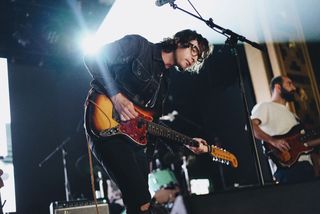
Lung: “You know the main riff on Half a Human? Is Julian doing that?”
Courtney: “Yeah. And he wrote that.”
Lung: “That's interesting. So you had chords and then he put that on top? So in a sense it’s quite traditional band songwriting?”
Courtney: “Yeah. Often when there's a little melody built into the rhythm that I'm playing, it gives Julian an opportunity to harmonize off of that, or play off that. He's really good at listening to what everybody else is doing and figuring out how he can fit himself in, which makes him unique as a player.
“On this last record, we wanted to be like, ‘Don't be afraid to step out, Julian, you're like the best musician in this band and you're very capable of like, playing, a super ostentatious solo [laughs], so like, just go for it.’”
“And I think he did on this record, we really gave him that space to do that. On Half A Human there's this big, like jam section at the end of that song. I'm kind of soloing, but it's not really a solo, and then he comes in and then he's playing off of what I'm playing. And like, no one is really forming a bed for someone to solo on top of, it feels like everyone's kind of moving together.”
Lung: “I remember when I was growing up, my dad, who plays music as well, said to me; ‘Why don't all the members of the band solo at the same time?’, which is kind of what you're saying, but without stepping on each other's toes. I think the idea of the guitar solo is still a bit of a taboo – it really goes in and out of fashion.
“There are quite a few guitar solos on your EP, and there's loads on mine [laughs]. I think there's a real place for them. Like for me, when you hit that solo it's often the emotional peak of the song.”
Courtney: “I love a good solo. And I actually love your playing in the way that you solo on your record. Obviously, there's a lot of Beatles influence, it seems like very George [Harrison] in a great way.
“I feel like they may go in and out of style, but everybody likes a good guitar solo. Like you know, Chris Cohen, he's also like, he's really good at like, well he's good at everything, but I love his solos. I love his style of playing his guitar.
Lung: “That SG tone, all bridge pickup. I went to see him live and I swear, he's like, picking right at the bridge with the edge of his thumb nail, and it's his sound. He has this like ‘no sustain’ sound.”
Courtney: “I've never confirmed this with him, but I've always wanted to ask him if he detunes his guitar when he's playing lead parts, because it always sounds slightly off in such a pleasing way to me, just a hair flat or sharp. I feel like he does that intentionally. I might be completely wrong.”
Lung: “I mean, I've only met him in passing a couple of times, but he seems like such an unintentional person if that even makes sense. I bet he just tunes by ear.”
Courtney: “Yeah, that could be the case. You reminded me of something, since this is for a guitar publication and you're talking about the way people pick – Julian uses jazz picks.
“They're extremely thick, really small. There's zero give to them, and there's like just a tiny bit of pick sticking out so he's right up against the string. But he does a lot of palm muting and stuff so I mean it makes sense, but I think only ‘real’ guitar players can play with those.”
Lung: “Let’s do it. Let's talk plectrums [laughs]. This is my brand. You know, these [holds up Jim Dunlop Grey 0.73mm]?”
I tend to double everything, so maybe 12-string and also the Jaguar
Martin Courtney
Courtney: “Oh, yeah. Yeah. skinny guys. I go for the orange guys [Jim Dunlop Orange 60mm]. I like those grey ones for acoustic guitar just to get that kind of percussive sound.
Lung: “Yeah, when you balance an acoustic guitar in the mix when there's drums and electric guitar in there it just becomes a rhythmic element, and so those thin plectrums help you make the nicest rhythmic sound possible. A pet sound of mine is a really thin plectrum on a really beautiful 12-string acoustic guitar. Is there a 12-string I hear on Half a Human?
Courtney: “Yeah. I tend to double everything, so maybe 12-string and also the Jaguar. I have an old Fender Electric XII that I use a lot. I know what you mean about the acoustic 12-string as well – have you ever played a Nashville-tuned/Angel hair guitar? It's basically an acoustic guitar that only has the upper strings of a 12 string. They sound amazing, especially in a mix.
“Sometimes instead of using a proper 12-string acoustic we use a regular acoustic and a Nashville together to fake a 12-string, and then you hard-pan it left and right. If you're arpeggiating stuff it's interesting because the top three strings are an octave up and you don't have the lower octave to ground it. It's such a weird sounding effect but it's got a different, like extra harmonic quality.”
Lung: “Yeah, you can't put your finger on it. Reminds me of Joni Mitchell playing the Dulcimer.”
Courtney: “Yeah, totally. That's a similar sound for sure, super skinny strings. Another thing Julian did was to double track an acoustic guitar, but to tune it like five cents flat on one track and five cents sharp on the other.
“They sound out of tune separately, but when you put them together, it just sounds like chorus. I've always wanted to try that with a 12-string acoustic but just tune each string slightly off from the other one.”
Lung: “Speaking of playing with pitch, do you mess about with varispeed much when you record?”
Courtney: “What is that?”
Lung: “Changing the overall speed and pitch up or down on a tape machine or on your DAW.”
Courtney: “I actually wanted to ask you about that on your record, because I've noticed there was some warbly stuff happening. Real Estate just did a session where we did a bunch of covers for Aquarium Drunkard recorded remotely.
“And then I mixed them down to my four-track and I was having fun messing around with the speed thing to get that vibrato effect. And yes, I like that a lot. I actually just got this pedal, the Vongon Ultrasheer, which is basically like a Lexicon digital reverb but the other half is like a vibrato and it has a Random function. So it can do just a normal vibrato but you can also do like, you know, this kind of wobble thing that I love.”
Lung: “Funny you mention that because I found this pedal called the Random phase/vibrato. It's by Mid-Fi electronics and it's the clean guitar sound on Bad Hair Day.
“You can't get it shipped to the UK because I think it has plutonium in it [laughs], so I had to get it sent to my friend in New York who then sent it to me. Basically when it's dimed it's random vibrato and as soon as you turn the dial, it introduces the random phase as well.
I was kind of afraid of distortion for many years. I didn't really know how to use it because I didn't really have that phase where I tried trying to teach myself how to rock
Martin Courtney
“I've always thought vibrato was a great sound, but it's so overused and so recognizable. And I realized it's because it's the regularity of the waveform right? As soon as you take that away, it stops being an effect and sounds like an old cassette or something. It becomes unpredictable.”
Courtney: “Yeah, is that Doug Tuttle? I don't have any of his pedals, but I am a fan. He's made one called 'For parts or repair' and it's like a random warble thing, but then the other half is like it just adds drop outs, like your guitar will randomly cut out. It basically makes your guitar sound bad in such a cool way. That's kind of like something that is new that hasn't been done, you know, up until recently.”
Lung: “I'm getting interested in pedals with in-built gates. On the solo for Bad Hair Day it's a Z.Vex Fuzz Factory and nothing else. And the funny thing is that pedal’s so ubiquitous with Matt Bellamy from Muse, but if you put that sound in a new context, where the rest of the music isn't so 'rock', I think it's really cool.
“I think distortion can be so annoying sounding mostly because of extraneous noise, but with the Fuzz Factory you have this really ragged square wave clipping which can then be gated so you go from really aggressive noise to complete silence when you stop playing. From one extreme to the other.
“Do you have an overdrive pedal that you really like? I'm quite attached to my Pro Co Rat for a more general distortion sound.”
Courtney: “I always use my Boss Super Overdrive that I've had since high school and has been on my pedalboard since you know, always. I use it almost like a boost. It just sounds like a classic distortion, but you can mess with the tone and brighten it up and stuff.
“I was kind of afraid of distortion for many years. I didn't really know how to use it because I didn't really have that phase where I tried trying to teach myself how to rock, I never learned how to rock [laughs] I played bass.
“I eventually learned guitar by learning Elliott Smith songs and stuff. Not that he doesn't use distortion, but I just mean like, I was kind of already into ‘cleaner’ music early on. Recently though I did just get this Supro amp. It's like a tiny little five-watt amp and it sounds really cool. But a really fun thing about it is you can plug it directly into your computer, and it sounds really good. If you just turn down the master on the amp, it's good for me for home recording because I can get really good sounds without actually making any noise.
“But the actual sound out of the amp if you crank it all the way is really cool and weird-sounding, it's really like messed up. When you hit a chord on your guitar it's like it's almost got a built in natural compression or something.”
rLung: “Yeh, like it's trying to push all that sound through a tiny little speaker. I love the way that little speakers sound, it might even be part of that Chris Cohen sound as well. I went to see him play when he was in Cryptacize and he played through a little Vox solid state practice amp but somehow had the best tone.”
Courtney: “I think I'm gonna get into playing the Supro live. I've been kind of getting smaller and smaller amps. I used to use a Hot Rod Deville with the 4x10s for the first five years of Real Estate, that's what I used.
“It's loud enough if you're playing places that don't have a good PA or whatever. Then I got into like the Deluxe Reverb, the '65 reissue because those are really much better sounding and all the backline companies have them.
“After that I got into using two amps so I got a '70s Vibrolux Reverb, similar to the Deluxe Reverb, same size and wattage and stuff, and I would use the Vibrolux and the Hot Rod together.
“I would run my pedals through the Hot rod and then I'd keep the Vibrolux clean with reverb. And then I went up another level [laughs]. I got rid of the Hot Rod altogether and the Vibrolux became my big amp and I got a Princeton because I wanted a little bit more character to my tone. A little bit of distortion in there. The Princeton is sort of low enough wattage that you can crank it and it'll break up around like three or four.”
Lung: “Yeah I've got one too. It's cool.”
Courtney: “Mine's a '68 reissue and it sounds pretty good but it still doesn't quite break up enough. So I think I want to try the Princeton with the Supro and have the Supro be halfway messed-up sounding.
“I like to have the pedals go through one amp that's relatively clean, and another amp there just for like, character.
“What's your amp situation? What do you like to use mostly?”
Lung: “Well, I had that 72' Princeton reissue for a while and it's good, but it needs repairing. One of my favorite things I've used recently is my friend's Fender Deluxe black face reissue. Just that with a Jazzmaster with volume at about four or five is just pretty perfect for me. I believe it's like the 112 version.
“For the album we exclusively used a boutique Vox AC30 head. It's switchable between 15/30 watts. We sometimes went through a Celestion 2x12, but we also went through like, crap speakers, like shit ones they just had lying around. There was an Ampeg speaker and then like, one just like no brand.”
Courtney: “And then like that's like a passive speaker powered by the Vox. That's cool.”
Lung: “Especially for rhythm sounds, the shit speakers would give more character. And then like solos I generally would just go through the 2x12. But I was gonna ask you – you know Marcus Deebank from Felt had the most compressed sound ever and Felt were an early influence on you, what's your stance on compression? Compression before the amp? After the amp with outboard/plugins? Both? Does it depend?”
Courtney: “See I mean, first of all I always thought with Felt, a lot of his tone on those records - I love the sound of it. But I'm always scared to do it myself, just so ‘straight up’ like that. Certain songs sound like a guitar just plugged right into the board.”
Lung: “I was gonna ask you about DI.”
Courtney: “I've gotten pretty fond of it. Um, but yeah, compression is something that I don't really ever even use. Julian does, he has a compression pedal on his board. And now I've gotten into using my huge Universal Audio interface and I'll use compression in post and I have noticed that it just helps things sit better in the mix.
“I had a compression pedal for a while, it does almost give you that like, DI kind of sound. We have a song called Stained Glass that I used to use it on a lot because it's so arpeggiated, I thought the compression would help. Kind of like making each note stick out on its own, or something. I thought also with the 12 string, it would just help rein in the wild-ness. I'm not like a huge compression user.”
Lung: “That's actually the opposite of what I expected.”
Courtney: “Sorry!”
Lung: “No, that's great. Speaking of DI I got this baritone Danelectro guitar recently, it's huge, and it's really good DI’d because obviously you need like the right amp to get all that low-mid information. Then if you put like the Oceanway room emulator on it, it sounds like instant Steve Albini.”
Courtney: “I love that. I'm totally pro DI. On the song Darling I ran my guitar through this 12 stage Phaser (Moogerfooger) and then DI and it just sounded so good and tight sounding.
“We did a good amount of DI guitar on that record (In Mind, 2017) because in my head, that record feels like almost electronic music. It has that kind of tightness to it, not a lot of air in the mix, which was 100% I think what we were going for on that record.
“We kind of went fully in the opposite direction for The Main Thing (2020) where we were worried that we were like pegged as like washed out, chill-wave river-beach chill band [laughs] We kinda just didn't want somebody to call us chill, you know? That word means nothing, and I kinda hate it.”
Lung: “Just wait till you break out the Supro.”
Courtney: “But with The Main Thing, we were just like, ‘Screw it, we're just gonna do whatever feels right.’ What I mean by that is just that we wanted to make something that felt really good to make, and we were like ‘We're gonna really indulge ourselves here and not put any sort of limitations on what we're trying to do here.’
“And I think what that ended up being was like we made something we could've eight years before because, like, I don't know, that's kind of where I naturally tend to gravitate towards – an open sound, more air in the mix.”
Lung: “I remember listening to those early records when they came out and thinking it's interesting how you can really hear the space around the instruments. I've been listening again recently, and I was thinking that especially on Days, you're really hearing the sound of the room – that's definitely something I hear on the new EP too.”
Courtney: “Same producer, same room. And speaking of weird styles of recording guitar, Kevin McMahon, the guy who produced these records, he's crazy as hell. When we're overdubbing guitar he'll have like 12 amps in a circle running into each other, all playing, all on at the same time, and he'll just move the mics around or have them all miked running into his sideboard mixer.
“Then he'll be like, okay, like a little bit more of this, this one a little bit less etc, and they're just all going at the same time. So there's obviously a lot of bleed. So that's why I feel like the guitars have this kind of very large, kinda blurry sound. It works! Generally I think it works better for heavy rock, which is what he is used to doing. But it works for us too, It just gives us a different kind of sound.”
Lung: “This mic'ing technique is not as drastic or anything, but I remember when we were making Miracle, we'd left the mic set up in the wrong place. And we had the fader up and my co-producer (Brendan Williams) was like ‘Oh, sorry, that's the mic in the wrong place’. And it was pointing at the wall rather than the amp.
“And I was like "No, that's amazing. What are you talking about?" Just because it was a little off axis and it was a little bit in the wrong direction, it was great because I couldn't identify the sound. Engineers often have it in their head like, ‘Oh, no, that's wrong’, but sometimes, the wrong sound is exactly what the song needs. So did you take anything from the Half a Human EP to finish at home?”
Courtney: “I didn't really because I live close to the studio that we made it in. But when we were making the last record, the rest of the guys would fly in to do a week of recording, and then they would go back home.
“And our producer would always be like, ‘Record at home too! Just send me stuff!’ We were like, that's a crazy thing to do. Like, why would we record at our house, it's not gonna sound good.
“But now I'm way more open to that, he'll just run it through all his nice outboard stuff there, and it'll sound great.”
- Best guitars for indie rock: iconic brands and signature sounds
Sam was Staff Writer at GuitarWorld.com from 2019 to 2023, and also created content for Total Guitar, Guitarist and Guitar Player. He has well over 15 years of guitar playing under his belt, as well as a degree in Music Technology (Mixing and Mastering). He's a metalhead through and through, but has a thorough appreciation for all genres of music. In his spare time, Sam creates point-of-view guitar lesson videos on YouTube under the name Sightline Guitar.
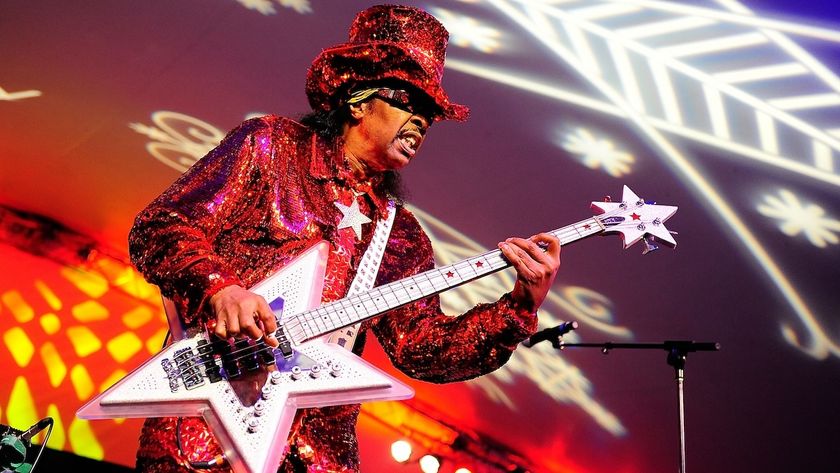
“The bass is the instrument you need to play the longest to become truly funky”: 20 funk bass legends who took low-end groove to new heights
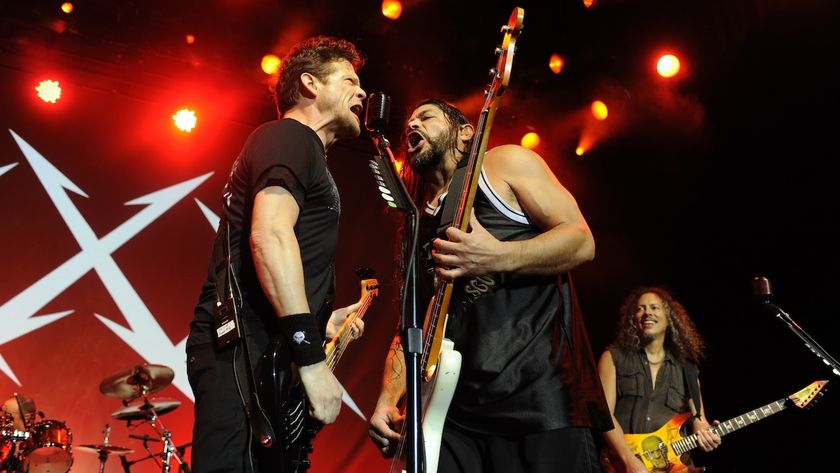
“There’s an art to simplicity, and Jason Newsted brought that art. Cliff Burton was more aggressive, and a busier player”: The bassists of Metallica


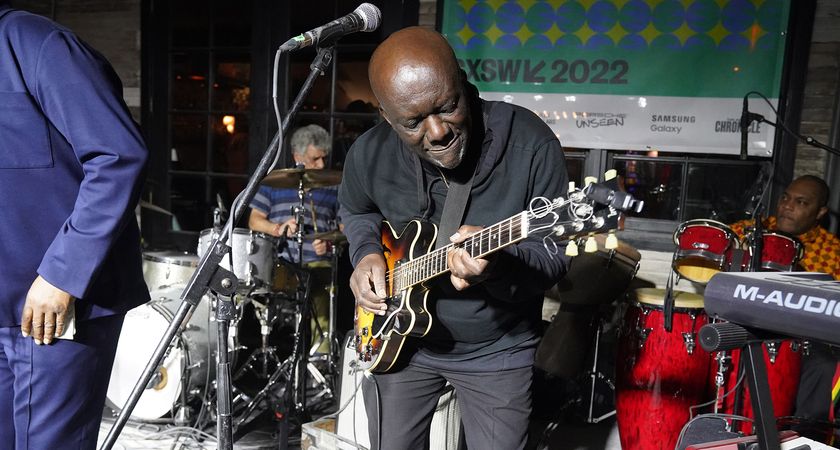
![[L-R] George Harrison, Aashish Khan and John Barham collaborate in the studio](https://cdn.mos.cms.futurecdn.net/VANJajEM56nLiJATg4P5Po-840-80.jpg)
